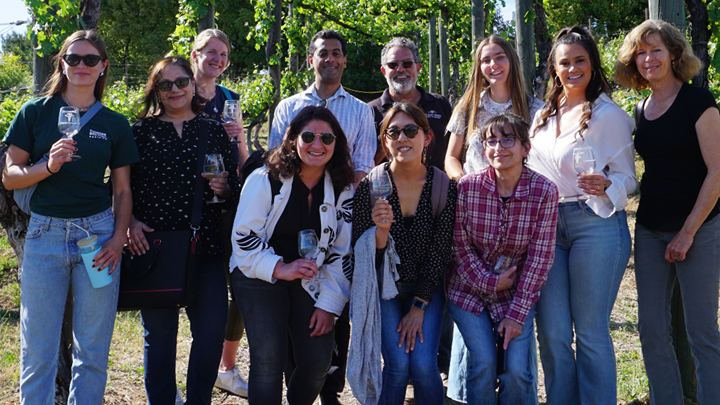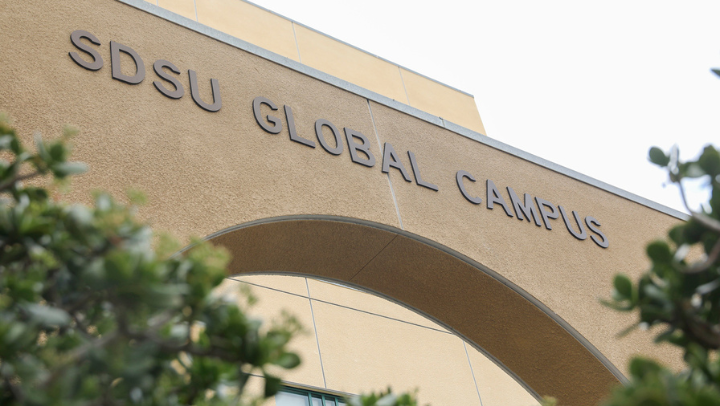San Diego farming studied for insights on regenerative agriculture, climate change
SDSU geography students shared their research findings with farm and vineyard owners after a year-long internship.

Farmers maintain a vital role in the food systems of the San Diego County economy. Many rely on regenerative and environmentally beneficial farming practices to combat climate change. Increasingly farms and farmers are facing, and must adapt to, extreme heat, severe drought, and intense wind events.
Amy Quandt, San Diego State University associate professor of geography, has worked across campus with biology, geography, sustainability, and environmental science graduate and undergraduate students to conduct surveys of farmers throughout the region. In her Human Dimensions of Climate Change (Geography 360) and special study (Geography 499) courses along with a subsequent internship, students gained hands-on experiential learning and research opportunities on topics of agroforestry, agriculture, and climate change in Southern California.
In spring, geography master’s student Judy Bross led a team of undergraduate researchers, funded in part by a $5 million USDA NextGen grant, in the creation and distribution of a survey to 700 farmers across San Diego County. The goal was to understand the challenges farmers are facing due to extreme weather conditions.
Bross saidthe team used a model developed by climate researchers at the National Center for Atmospheric Research to generate potential climate outcomes for the region
In surveys, farmers were concerned about the impacts of extreme heat on their avocado trees in particular, as well as citruses and grapes. In order to adapt, farmers reported they are adjusting their irrigation and soil management strategies, as well as transitioning to resilient crop types and diversifying the types of crops on their farms.
Farmers identified that planting more trees on their farms, a form of agroforestry, is one way to help mitigate extreme heat by helping to maintain soil moisture, and providing both habitat for pollinators and shade for crops. Some 82% of farmers in the survey are actively integrating tree plantings on their farms.
As part of the yearlong internship, six undergraduate students boarded a helicopter in January for a birds-eye view of a farm and ranch at Rancho Guejito in the San Pasqual Valley. The tour provided a glimpse into how the farmland was used for cattle and crops.
“Going into this internship I knew it was going to be very different from anything else that I have ever done but this interactive research gave me a whole new perspective of how hard it can be to produce food,” said Amber Fisher, geography major with an emphasis on water, climate and ecosystems.
“Listening to the processes and how people have had to alter the way they farm due to extreme weather truly showed how hard it can be to keep up with all the global changes,” a problem Fisher said is aggravated by government regulations and water restrictions.
Winegrape growers
Quandt also led Corrie Monteverde, Ph.D. in geography (2024), and doctoral candidate in biology, Alessandra Zuniga, in conducting a survey on the impacts of climate change for winegrape growers across San Diego, Riverside and Orange counties.
Despite drought and associated conditions, earlier or more variable harvest dates, and earlier bud burst on their vineyards only about four in ten reported actively monitoring the microclimate on their vineyards. One of every five reported planting more heat and/or drought tolerant grape varieties.
Researchers presented their findings to the Small Winegrape Growers Association in Temecula in May.
“Meeting face-to-face with the farmers at the Wilson Creek event was incredibly enlightening and rewarding,” Monteverde said. “It provided a unique opportunity to hear their firsthand accounts of the challenges they face and their innovative solutions. The interactions deepened our understanding of the practical realities of farming in the context of climate change and reinforced the importance of collaboration between researchers and farmers.”
Through the USDA grant, SDSU plans to provide ongoing education and resources to farmers that will be key to sustaining climate change mitigation and adaptation efforts.“This collaboration is crucial for developing adaptive strategies that are both scientifically sound and practically feasible,” Monteverde added. This work highlights the importance of continued dialogue and partnership between researchers, farmers, and policymakers.
Bross plans additional presentations to the Avocado Growers of California in August and the Society of American Foresters in September. “I’m excited to represent San Diego State University in these really important conversations,” Bross said.
Funding
Alessandra Zuniga and the winegrape study was funded by The Educational Partnership Program with Minority Serving Institutions (NOAA-EPP/MSI) and the NOAA-CESSRST-II for full research and fellowship support under the Cooperative Agreement Award. Judy Bross, and Amy Quandt’s farmer survey was funded by The National Center for Atmospheric Research's Early Career Faculty Innovator Program, which is funded by the National Science Foundation.
The undergraduate students who assisted Judy Bross were funded by USDA’s National Institute of Food and Agriculture’s From Learning to Leading: Cultivating the Next Generation of Diverse Food and Agriculture Professionals Program (NEXTGEN).



